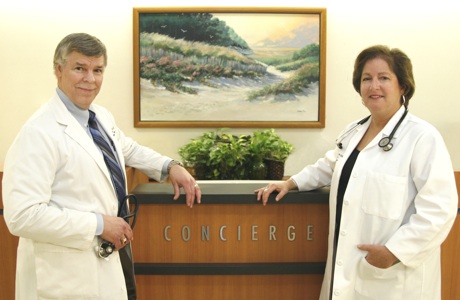

The Virginia Beach Premier Medical NewsletterSeptember, 2011
New Technologies in Medicine
Artificial retinas have been implanted in about 30 blind patients so far. They help improve visual ability by using a tiny video camera on glasses that transmit the image to a special sensor implanted on the retina that then transmits the image to the brain.
New blood thinners promise to replace the age old warfarin (Coumadin). Pradaxa, For example, reduces risk of stroke in patients with atrial fibrillation better than Coumadin, and patients don't need to have their blood checked like they do with Coumadin. Two other blood thinners are being tested now, but are not yet available. A new drug called Provenge is now available that stimulates the body's immune system to fight prostate cancer. It prevented risk of death in prostate cancer patients by 24% over a three-year period in one study. A new treatment for depression is available in some areas. A small electromagnet is placed on the scalp behind the left forehead, which delivers a tiny electric current to the prefrontal cortex of the brain. It appears to be 3 times more effective than placebo in controlling depression. A new glucose monitoring tattoo made with tiny nano-sensors can be placed on the skin once a week. A handheld device can then be used to scan the tattoo several times a day. When the tattoo becomes dark, the sugar is too low; when it lights up, it's too high. A mirror has been developed that is able to take your vital signs just by standing in front of it. Within the next 3 years stem cells harvested from the patient's own bone marrow may be used to heal heart and artery diseases. Reference: AARP Magazine, Sept-Oct, 2011.
Tylenol–New Dosage Recommendations
Tylenol is one of the safest pain relievers on the market, but there have been concerns that using too much of it could contribute to liver problems.
Because of these concerns, the maximum dose for over-the-counter Tylenol has been reduced. The new maximum dose is 3000 mg, or 3 g, daily instead of 4000 mg daily as it has been until now. That means you can only take 2 extra strength Tylenol tabs 3 times a day; or for regular strength, it would be 2 tabs 4 times a day.
"Bloodless" Glucose Meters
Some of the TV ads you've been seeing about glucose meters are somewhat misleading. It seems like they are saying that you don't have to stick yourself anymore.
This is not really true. The reality is that you don't have to stick your fingers any longer with the new meters, but you still have to stick yourself somewhere else – like your arm or your leg. If you are a guitar player like BB King, it might be important. Unfortunately testing in alternate areas isn't as accurate as finger testing however. So if accuracy is critical, like if you are changing your insulin dose, it's always better to do finger testing. Some of the new meters do require smaller amounts of blood then their predecessors. There was one meter that tried to measure glucose through the skin, but it had many problems associated with it, and it is no longer available. A lot of research is being devoted to making one that does accurate testing without the needle stick, so keep your fingers crossed.
Zocor vs. Norvasc
A new alert has been circulating indicating a drug interaction between Zocor (simvastatin), the cholesterol–lowering medication, and Norvasc (amlodipine), the blood pressure lowering medication.
The problem is that Norvasc increases the risk of muscle pain or inflammation in patients who were taking more than 20 mg of Zocor. It doesn't seem to have the same effect on other statins, like Lipitor or Crestor. If you are on both of these drugs (Norvasc and Zocor) and if you are taking more than 20 mg per day of Zocor, it would be good to check with your doctor to see if you could either lower the dose of Zocor or change to a different statin. Zocor has been one of the more popular statins lately because it is available in the generic form, and insurance companies cover it without requiring preauthorization. Lipitor will become generic in November of this year and may become the preferred medication because of fewer drug interactions.
Antiplatelet Drugs
Many people are on antiplatelet drugs–like aspirin, Plavix and Aggrenox – for a number of reasons, usually to prevent stroke or heart attacks. If you have had a drug–eluting stent put in somewhere to keep an artery open, you've probably been started on Plavix, which is often combined with aspirin.
It's very important to stay on this for at least a year following the stent insertion in order to prevent the stent from blocking up with clot. Depending on where the stent was placed, stopping the antiplatelet agent too soon could have very hazardous consequences. It is not necessary to stop Plavix prior to most minor surgeries. If you have to stop it before a procedure, start back on it as soon as the surgeon gives the okay. Of course there are certain situations where the antiplatelet drugs become contraindicated, such as in the presence of a major or life-threatening hemorrhage.
Metabolic Syndrome
About 47 million Americans have a diagnosis called metabolic syndrome.
This term refers to a clustering of risk factors, which together magnify the risk of developing diabetes, heart disease and premature death. These risk factors include the following: 1. Fasting blood sugar greater than 110. 2. HDL cholesterol level less than 40 in men or less than 50 in women. 3. Triglyceride level greater than 150. 4. Waist circumference greater than 40 inches in men or greater than 35 inches in women. 5. Blood pressure greater than 130 systolic (top number), or greater than 85 diastolic (bottom number). If you have all these conditions, then you have metabolic syndrome and you are at risk. The good news is that it is possible to fix all of these things, which would then greatly lower your risk.
Irritable Bowel Syndrome
This is a very common disorder affecting about 7% of patients in the US. It is more common in women and usually starts between 20 and 40 years old. The cause is unclear, but it does not lead to cancer or any other serious diseases. Nevertheless, it remains the cause of many uncomfortable symptoms, including diarrhea, constipation, abdominal pain, bloating, nausea and poor appetite. There may be a lot of mucus present in the stool, but never any blood.
X-rays and blood tests are usually normal, so diagnosis is made on clinical grounds. Anemia and celiac disease should be excluded, and the possibility of lactose intolerance can usually be ruled out by the history. Colonoscopy may be necessary if the patient is over 50. Sometimes stool tests are required to check for infection or occult bleeding. Treatment may include increasing dietary fiber, anti-spasmodic medication, certain antidepressants, probiotics and a special antibiotic called Rifaximin.
Sinusitis
Sinusitis is an infection involving the nasal passages causing congestion, runny nose and facial pain, sometimes with fever and general malaise. 98 to 99% are viral in origin, which antibiotics won't help.
If the infection lasts for more than 7 days, or if there is facial pain and/or purulent discharge, the possibility of a bacterial infection increases, which then would justify using an antibiotic. Sometimes, a sinus infection can be rather difficult to clear. A short course of steroids is often used along with the antibiotic in these cases. Nasal irrigation with saline may be helpful. Certain nasal sprays like Afrin or Neosynephrine, and oral decongestants can be used for 2 to 3 days to provide symptomatic relief. Caution must be used with decongestants since they may raise blood pressure. Also, Afrin and Neosynephrine may become addicting if used more than 3 three days and actually can cause a rebound effect with worsening nasal congestion.
About Our Office
Virginia Beach Premier Medical is a membership “concierge” internal medicine practice specializing in comprehensive and compassionate, individualized and personalized patient-centered care. We pride ourselves on full continuity of care – in the office, in the hospital, or even at home.
If you would like more information about our practice please call us at 757-416-6750 or visit our website at www.vbpm1.com. Ask to speak with Brittany, our office manager, or Dr. Parks or Dr. Warth. We’d be happy to talk with you anytime.
Discount Referral Program
Here’s an incentive!
If you are a member of our practice and if you refer someone to us who then signs up, we will give you $200 off your next year’s fee.
Here’s another plus! You can accumulate these referral discounts so that if you refer multiple people who then sign up, you will get $200 off the next year’s fee for each one.
Happy September!!
|




